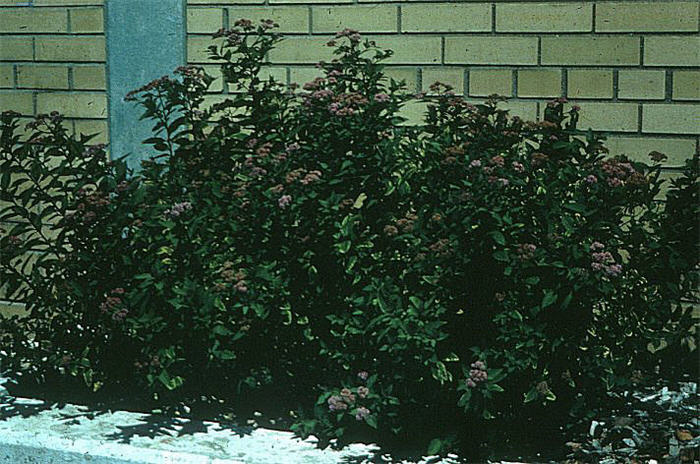| Botanical Name: Spiraea japonica 'Froebelii' | |
| Common Name: Froebels Spirea |

-
Anatomy
-
Culture
-
Design
Plant Type
Shrub
Height Range
1-3', 3-6'
Flower Color
Pink
Flower Season
Spring
Leaf Color
Bronze, Green, Purple
Bark Color
Brown
Fruit Color
n/a
Fruit Season
n/a
Sun
Full
Water
Medium
Growth Rate
Moderate
Soil Type
Sandy, Clay, Loam
Soil Condition
Average, Rich, Well-drained
Soil pH
Acid, Neutral, Basic
Adverse Factors
Attracts Bees
Design Styles
English Cottage, Formal, Mediterranean, Ranch, Spanish, Woodland
Accenting Features
Fall Color, Showy Flowers
Seasonal Interest
Spring, Summer, Fall
Location Uses
Entry, Perennial Border, Shrub Border, Foundation, Patio, Raised Planter, Walls / Fences
Special Uses
Cut Flowers, Hedge, Small Spaces
Attracts Wildlife
Birds, Butterflies
Information by: Stephanie Duer
Photographer:
Photographer:
-
Description
-
Notes
‘Froebelii’ is a somewhat compact spirea that typically grows to 3 to 4 feet tall with a slightly larger spread. Leaves emerge brownish-red in spring, change to blue-green as the growing season progresses and finally turn burgundy to wine red in fall. Small carmine red flowers in flat-topped clusters appear in June to July. This cultivar is synonymous with and formerly known as S. x bumalda ‘Froebelii’.
Grow in average, medium moisture, well-drained soils in full sun. Tolerates light shade. Tolerates a wide range of soils. Remove faded flower clusters as practicable (light shearing is an option) to encourage additional bloom. Flowers on new wood, so prune hard in late winter to early spring if needed (see Guides). ‘Froebelii’ is reported to have better heat and drought tolerance than most other S. japonica cultivars.